2019年北师大版高中英语必修2 Unit5 Rhythm lesson 2 Beijing Opera reading课件(41张ppt)
文档属性
| 名称 | 2019年北师大版高中英语必修2 Unit5 Rhythm lesson 2 Beijing Opera reading课件(41张ppt) |
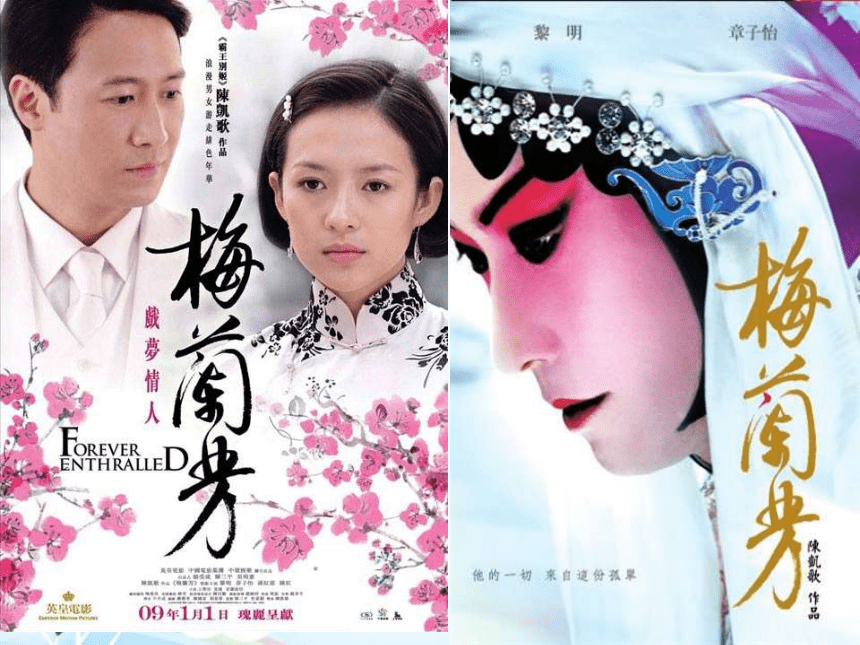
|
|
| 格式 | zip | ||
| 文件大小 | 2.9MB | ||
| 资源类型 | 教案 | ||
| 版本资源 | 北师大版 | ||
| 科目 | 英语 | ||
| 更新时间 | 2019-04-26 00:00:00 | ||
图片预览

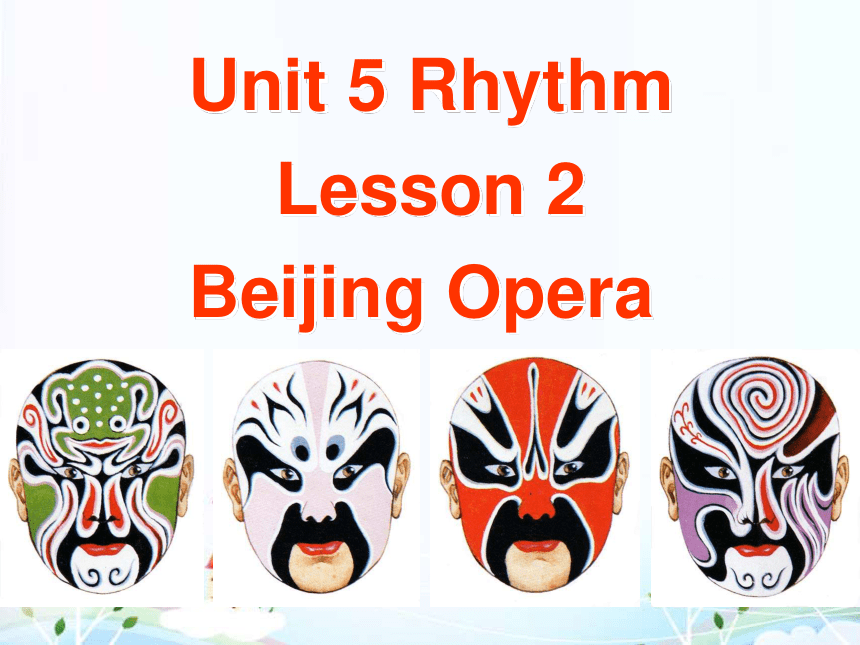
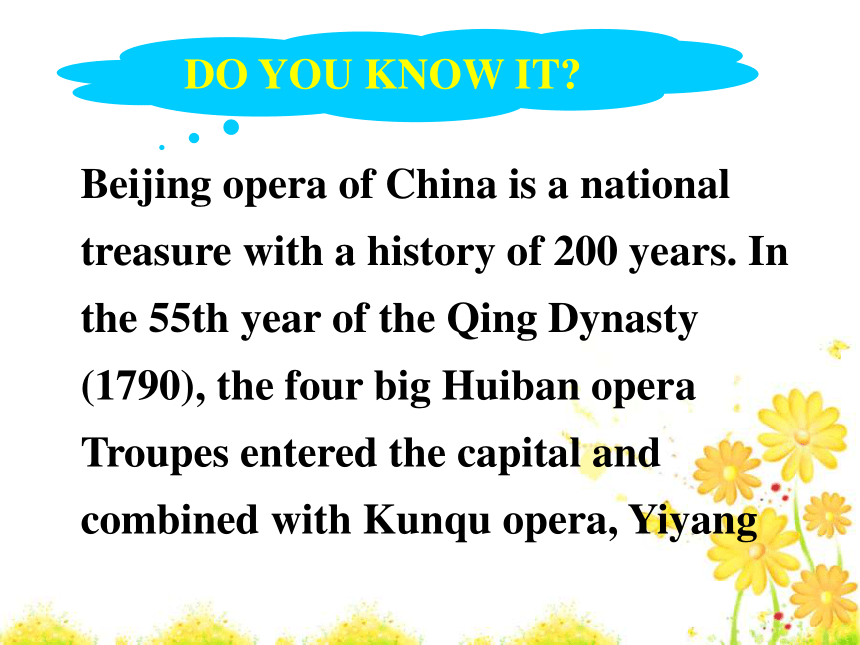
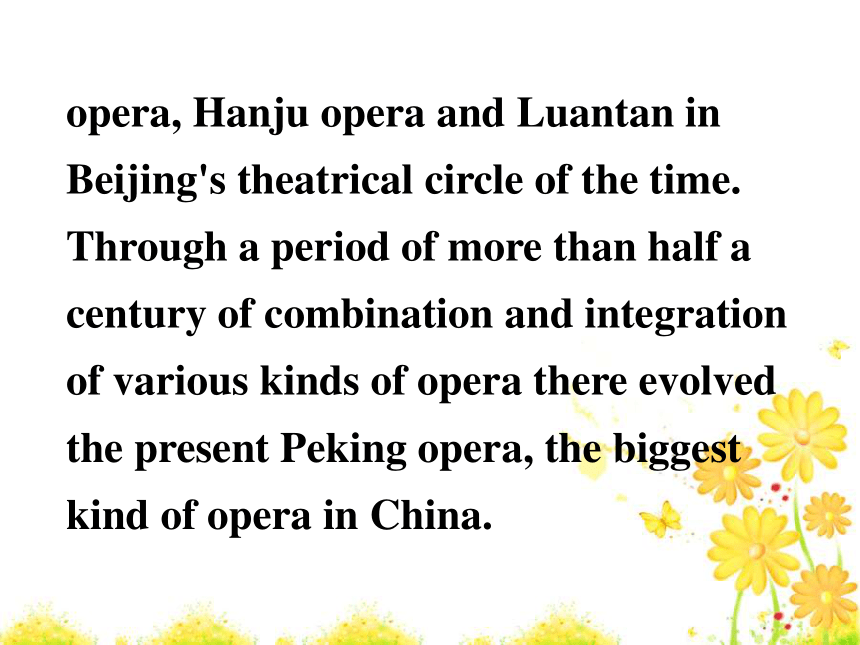
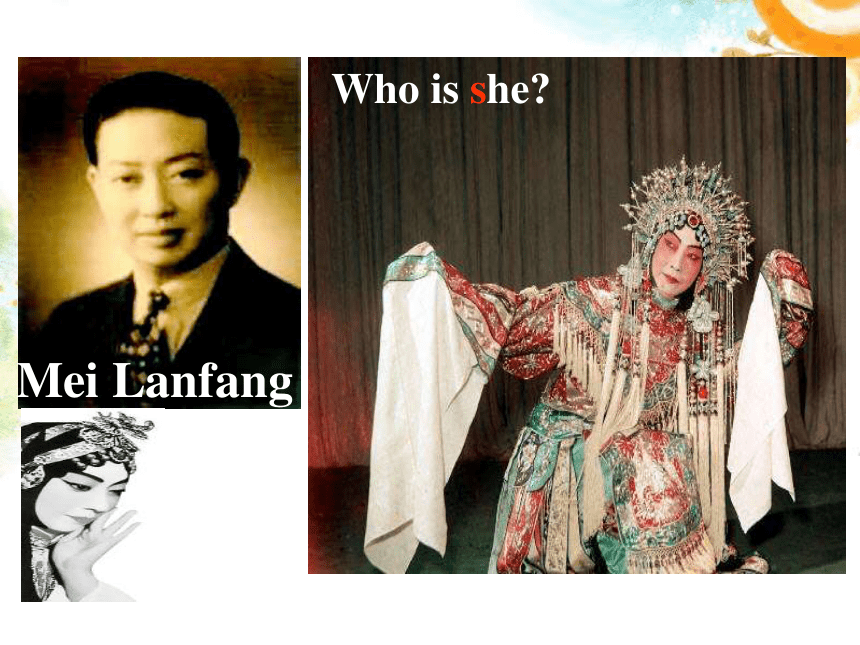
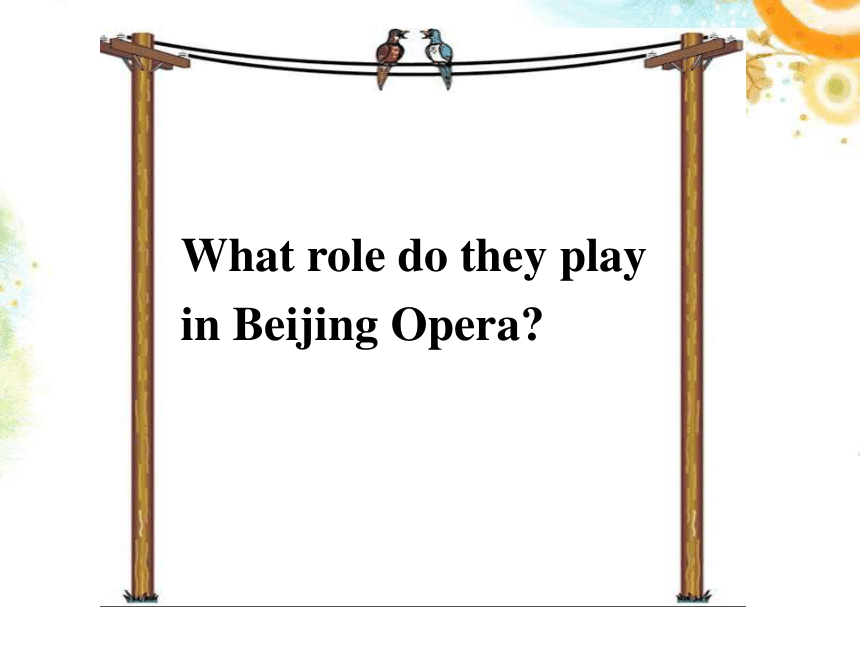
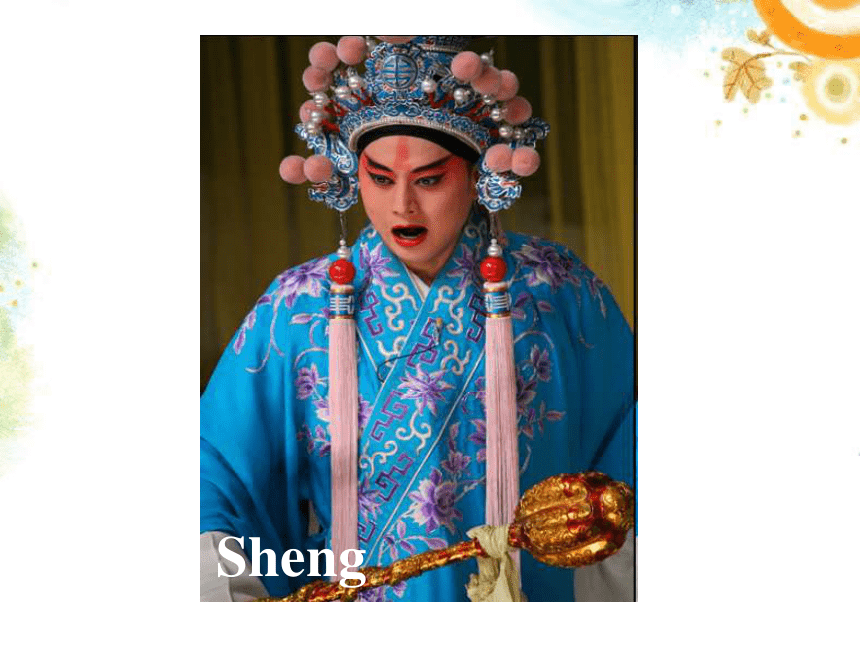
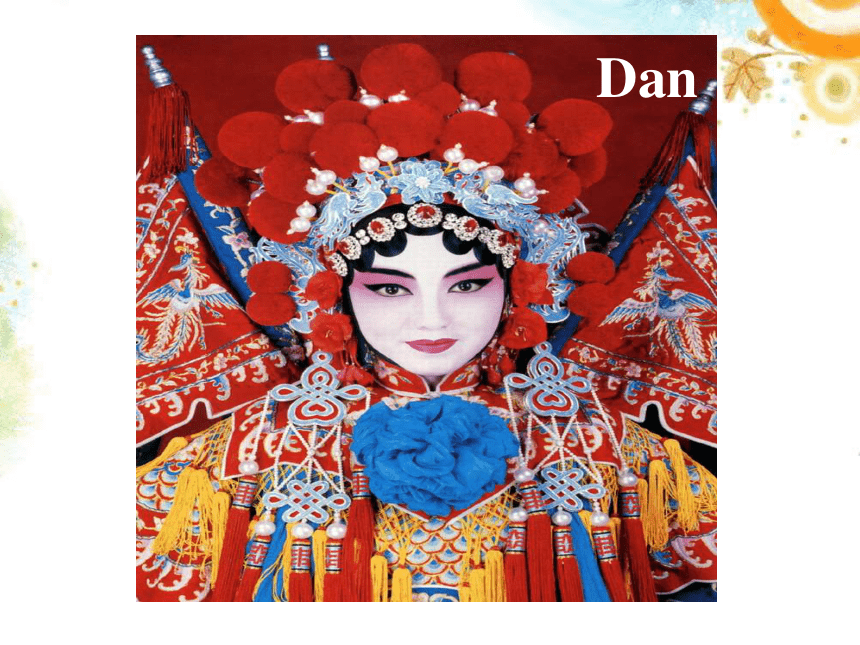

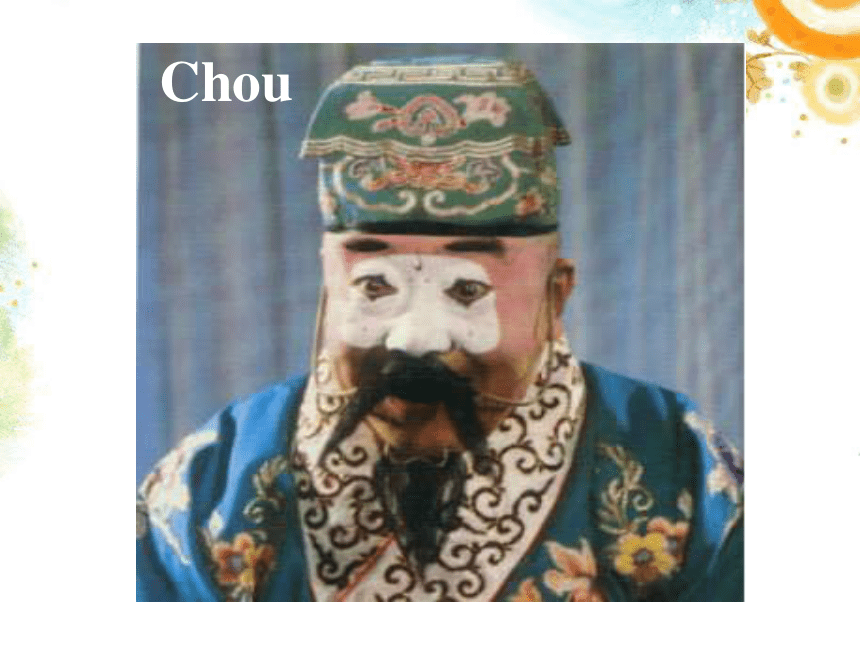
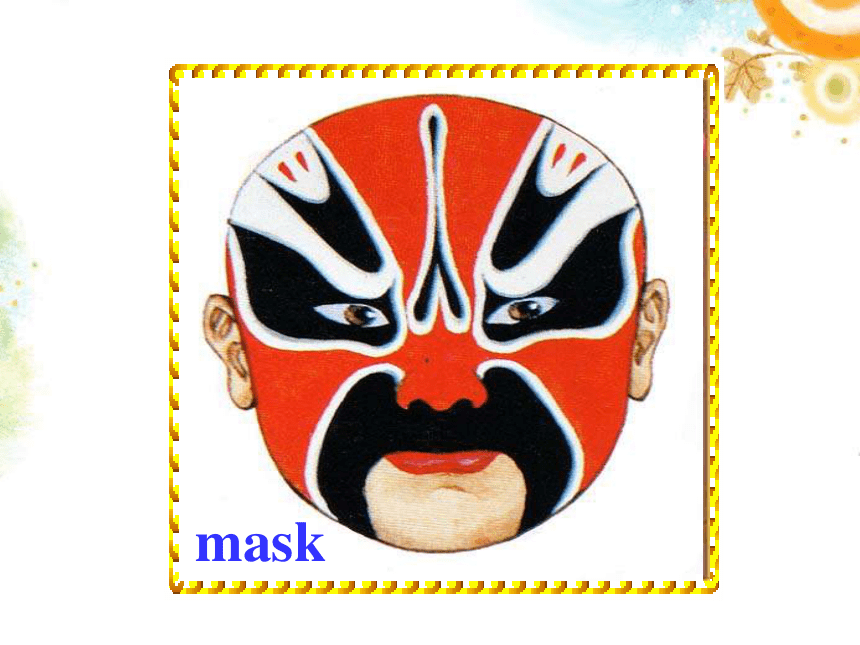
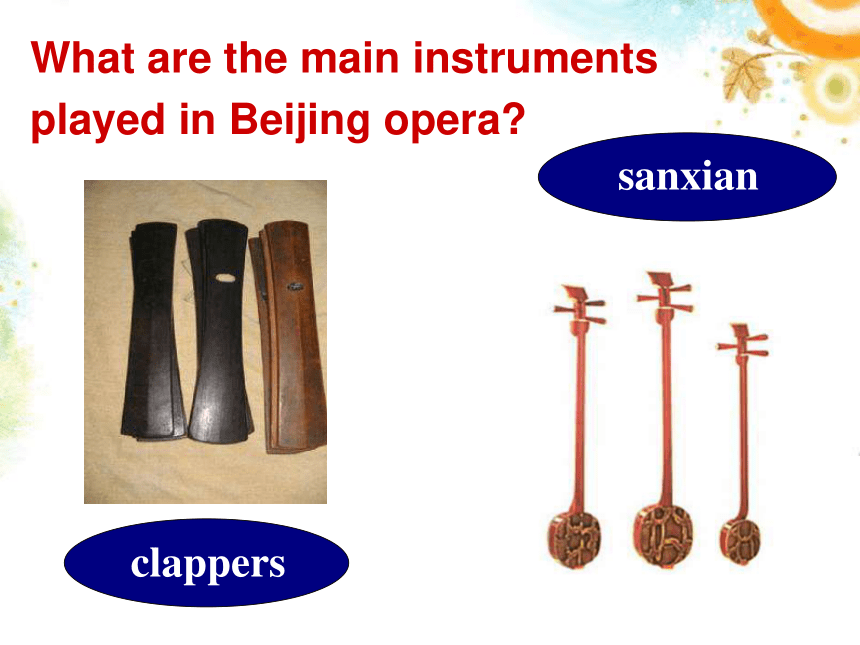
文档简介
课件41张PPT。Unit 5 Rhythm
Lesson 2
Beijing Opera DO YOU KNOW IT?Beijing opera of China is a national treasure with a history of 200 years. In the 55th year of the Qing Dynasty (1790), the four big Huiban opera Troupes entered the capital and combined with Kunqu opera, Yiyangopera, Hanju opera and Luantan in Beijing's theatrical circle of the time. Through a period of more than half a century of combination and integration of various kinds of opera there evolved the present Peking opera, the biggest kind of opera in China. Who is she?Mei LanfangWhat role do they play in Beijing Opera?ShengDanJingChoumaskclapperssanxianWhat are the main instruments played in Beijing opera?jinghudrumbass gong gongWhat do you learn about Beijing Opera? Work in pairs and choose the right answers.1. When did Beijing Opera start?
a) the late 18th century
b) the late 19th century
c) the late 20th centurya) the late 18th century2. How many main roles are there in Beijing Opera?
a) 4 b) 8 c) 123. What are eh main instruments played in Beijing Opera?
a) violin b) jinghu c) drum
d) piano e) sanxian f) guitara) 4b) jinghu4. Match the main roles with their names.
sheng male roles with brightly
painted face
dan female roles
jing clown roles
chou male rolesMatch the meanings with the pictures on P24:
Pic.1 They are in a city.
Pic.2 She is in a carriage.
Pic.3 They are in their new
bedroom.
Pic.4 She is on a horse. Symbols in Beijing Opera Match the following words with their meanings. Then use the words to complete the sentences below. combine, treasure, mask,
acrobatics, costumethe clothes worn in a play or film
mix two or more things
something with special
value
d) movements of one’s body in a skilful way
e) something that covers one’s facecostumeacrobaticsmasktreasurecombine1. This golden ring is a real
________.
2. My mother sewed my _______
for the school play.
3. I love watching _________ but it
looks very difficult!treasureacrobaticscostume4. The first step in making a cake
is to _______ the milk and
butter.
5. The singer wore a _____ that
was made of wood.combinemaskListen to the first and second part of a TV programme. Use the Strategies to answer the questions.1. What skills do Beijing Opera actors need to have?Acting, talking, singing, music, dancing and acrobatics.On open-air stages in markets, streets, teahouses or outside temples.2. Where was Beijing Opera
performed at the beginning?3. Why does it have very loud music and a piercing singing style?Because at the beginning, Beijing Opera was performed mostly on open-air stages, the music had to be played loudly and the performers had to sing with sharp voices.4. Why do performers wear
brightly coloured costumes?With bright colour, their costumes are more impressive and the crowd can see them more clearly.Read and listen to the last part of the programme. Then answer the questions.1. What does the stage look like
in Beijing Opera?Very simple.Many body movements can represent actions such as opening a door, climbing a hill, going upstairs or rowing a boat.2. How do symbols play an
important role in Beijing Opera?in other words “换句话说, 换言之”, 相当于that is, that’s to say, namely等。e.g. The children in the village are so
poor; in other words, they can’t
afford the education fees.
I’m bored with my job; in other
words, I don’t want to do it.word构成的其它常用搭配形式还有:
have a word with sb. 与某人谈一谈
have words with sb. 与某人吵架
have the last / final word 拥有最后决定权
keep one’s word 遵守诺言
break one’s word 违背诺言 holding a tasselwalking with a
flag on each sidefour generals
and four soldiersan army of
thousandsriding a
horse riding in a
carriageVarious body movements can represent actions.Listen to two dialogues. What do the students Li Ming and Zhu Meiling get permission for? What do they not get permission for?Li Ming –permission to go to Pufang’s birthday party/ not permission to go to the cinema.Zhu Meiling –permission to hand in her project next week /not permission to write up the project in Chinese.Listen again and fill in the blanks. would, can’t, let, could, OK, know, excuse me, must, everyone’s going, canYou (1) _____ my classmate Yang Pufang.
Well, Pufang’s going to have a birthday party this Saturday afternoon. Is it (2) _____ if I go? The party’s a special occasion and (3) __________________.knowOKeveryone’s goingInformalOh, all right…I’ll (4) ____ you go, but I need you to be back by 8 o’clock at the latest.
Thanks, Mum. And I was thinking…(5) _____ I go to the cinema with Pufang on Sunday?letcanWhat about your grandpa and grandma? Who’s going to help me look after them if you go?
Oh, Mum. Please let me go to the cinema.
You can go to Pufang’s birthday Party but you (6) ____ go to the cinema.can’t(7) __________, Miss Wang? (8) _______ it be all right if I handed in my project next week?
OK, you (9) _____ give me your project first thing on Monday morning.Would canExcuse meFormal(10) ______ I write up the project in Chinese?
No, I’m afraid you can’t. You (11) _____ use English like all the other students.mustCould More ways to ask for, give and refuse permission.1. May I …?
I wonder if I could ….
Do you mind if I …?
Would you allow me to …?
Would it be possible for me to …?
2. Yes, you may / can.
Oh, all right.
Go right ahead.
Not at all. / No, that’s all right.I’m afraid you can’t.
I’m sorry, but …
I wish you could, but …
No, I won’t permit you to.
I’m afraid I would mind if you …
Lesson 2
Beijing Opera DO YOU KNOW IT?Beijing opera of China is a national treasure with a history of 200 years. In the 55th year of the Qing Dynasty (1790), the four big Huiban opera Troupes entered the capital and combined with Kunqu opera, Yiyangopera, Hanju opera and Luantan in Beijing's theatrical circle of the time. Through a period of more than half a century of combination and integration of various kinds of opera there evolved the present Peking opera, the biggest kind of opera in China. Who is she?Mei LanfangWhat role do they play in Beijing Opera?ShengDanJingChoumaskclapperssanxianWhat are the main instruments played in Beijing opera?jinghudrumbass gong gongWhat do you learn about Beijing Opera? Work in pairs and choose the right answers.1. When did Beijing Opera start?
a) the late 18th century
b) the late 19th century
c) the late 20th centurya) the late 18th century2. How many main roles are there in Beijing Opera?
a) 4 b) 8 c) 123. What are eh main instruments played in Beijing Opera?
a) violin b) jinghu c) drum
d) piano e) sanxian f) guitara) 4b) jinghu4. Match the main roles with their names.
sheng male roles with brightly
painted face
dan female roles
jing clown roles
chou male rolesMatch the meanings with the pictures on P24:
Pic.1 They are in a city.
Pic.2 She is in a carriage.
Pic.3 They are in their new
bedroom.
Pic.4 She is on a horse. Symbols in Beijing Opera Match the following words with their meanings. Then use the words to complete the sentences below. combine, treasure, mask,
acrobatics, costumethe clothes worn in a play or film
mix two or more things
something with special
value
d) movements of one’s body in a skilful way
e) something that covers one’s facecostumeacrobaticsmasktreasurecombine1. This golden ring is a real
________.
2. My mother sewed my _______
for the school play.
3. I love watching _________ but it
looks very difficult!treasureacrobaticscostume4. The first step in making a cake
is to _______ the milk and
butter.
5. The singer wore a _____ that
was made of wood.combinemaskListen to the first and second part of a TV programme. Use the Strategies to answer the questions.1. What skills do Beijing Opera actors need to have?Acting, talking, singing, music, dancing and acrobatics.On open-air stages in markets, streets, teahouses or outside temples.2. Where was Beijing Opera
performed at the beginning?3. Why does it have very loud music and a piercing singing style?Because at the beginning, Beijing Opera was performed mostly on open-air stages, the music had to be played loudly and the performers had to sing with sharp voices.4. Why do performers wear
brightly coloured costumes?With bright colour, their costumes are more impressive and the crowd can see them more clearly.Read and listen to the last part of the programme. Then answer the questions.1. What does the stage look like
in Beijing Opera?Very simple.Many body movements can represent actions such as opening a door, climbing a hill, going upstairs or rowing a boat.2. How do symbols play an
important role in Beijing Opera?in other words “换句话说, 换言之”, 相当于that is, that’s to say, namely等。e.g. The children in the village are so
poor; in other words, they can’t
afford the education fees.
I’m bored with my job; in other
words, I don’t want to do it.word构成的其它常用搭配形式还有:
have a word with sb. 与某人谈一谈
have words with sb. 与某人吵架
have the last / final word 拥有最后决定权
keep one’s word 遵守诺言
break one’s word 违背诺言 holding a tasselwalking with a
flag on each sidefour generals
and four soldiersan army of
thousandsriding a
horse riding in a
carriageVarious body movements can represent actions.Listen to two dialogues. What do the students Li Ming and Zhu Meiling get permission for? What do they not get permission for?Li Ming –permission to go to Pufang’s birthday party/ not permission to go to the cinema.Zhu Meiling –permission to hand in her project next week /not permission to write up the project in Chinese.Listen again and fill in the blanks. would, can’t, let, could, OK, know, excuse me, must, everyone’s going, canYou (1) _____ my classmate Yang Pufang.
Well, Pufang’s going to have a birthday party this Saturday afternoon. Is it (2) _____ if I go? The party’s a special occasion and (3) __________________.knowOKeveryone’s goingInformalOh, all right…I’ll (4) ____ you go, but I need you to be back by 8 o’clock at the latest.
Thanks, Mum. And I was thinking…(5) _____ I go to the cinema with Pufang on Sunday?letcanWhat about your grandpa and grandma? Who’s going to help me look after them if you go?
Oh, Mum. Please let me go to the cinema.
You can go to Pufang’s birthday Party but you (6) ____ go to the cinema.can’t(7) __________, Miss Wang? (8) _______ it be all right if I handed in my project next week?
OK, you (9) _____ give me your project first thing on Monday morning.Would canExcuse meFormal(10) ______ I write up the project in Chinese?
No, I’m afraid you can’t. You (11) _____ use English like all the other students.mustCould More ways to ask for, give and refuse permission.1. May I …?
I wonder if I could ….
Do you mind if I …?
Would you allow me to …?
Would it be possible for me to …?
2. Yes, you may / can.
Oh, all right.
Go right ahead.
Not at all. / No, that’s all right.I’m afraid you can’t.
I’m sorry, but …
I wish you could, but …
No, I won’t permit you to.
I’m afraid I would mind if you …
